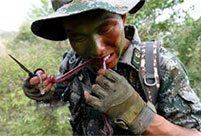

On Tuesday, the lawyers of Wang Lin, the self-proclaimed qigongmaster who was detained last week, said that there may be a major reversal in the case, but refused to disclose further information so as not to disrupt the police investigation. Wang was arrested on suspicion of involvement in kidnapping and murdering a disciple. The lawyers' words have aroused wide speculation.
After Wang's arrest, media have revealed a slew of reports for his behavior and his image became more disgraced. But ordinary people can hardly differentiate clues that can help convict him. Will his abundant photos with government officials and celebrities be categorized as fraud? These need the judgment of judicial organs.
The majority of public opinion is eager to see Wang convicted and given a heavy penalty for allegedly being complicit in killing his disciple. That would be the perfect ending for such a self-proclaimed master, who made piles of cash and was acquainted with celebrities and beautiful ladies. But now if there is indeed a reversal, will the public accept it?
Soon after the lawyers' words, angry speculation circulated online that Wang's friends in political and business circles may have attempted to absolve him of a crime. Public opinion considers Wang is already a criminal instead of a suspect and hence any harsh punishment is justified. If he gets away with it, that would mean injustice.
At this point, public opinion will find it unacceptable if the evidence indeed backs a reversal of Wang's case. That would pose serious challenges to the judicial organs as to whether they can settle the lawsuit in accordance with the law.
The crux of Wang's case is that Wang's guilt, as widely considered, is in his morality, in violation of laws or both. Now that there may be a major reversal in the case, are we willing to put more faith in the court's verdict than our moral instincts?
The Chinese public will need to encounter some extreme cases where one is deemed guilty but may be eventually exonerated by the court. China's judicial organs lack authority but public opinion is powerful. This has both pros and cons and depends on whether the rule of law is on the right track.
All are equal before the law. In other words, everyone should have their wrongdoings accounted for and meanwhile their rights protected.
The righteousness considered by the public does not always mean justice. In the Internet era, justice means that the judicial organs have to be independent of strong public opinion.
We have no favorable impression of Wang and think it appropriate to call him a swindler. But unclear as to the nature of his behavior, we choose to put trust in the judicial organs. This should also be the attitude that the public takes toward the increasing number of disputed issues.
 Soldiers serving at Liaoning aircraft carrier
Soldiers serving at Liaoning aircraft carrier Bikini beauties lifeguards in river rafting place
Bikini beauties lifeguards in river rafting place PLA soldiers eat raw snake meat in harsh training
PLA soldiers eat raw snake meat in harsh training Doctors use 3D-printed skull to save girl
Doctors use 3D-printed skull to save girl Kiss contest held in Nanning, SW China
Kiss contest held in Nanning, SW China Yunnan-Myanmar Road: The past and present
Yunnan-Myanmar Road: The past and present Campus belle of Xiamen University gets popular online
Campus belle of Xiamen University gets popular online Who says moms cannot be trendy and hot?
Who says moms cannot be trendy and hot? Eight fruits that defend men's health
Eight fruits that defend men's health  Ling’s fall caused by wild ambition, desire
Ling’s fall caused by wild ambition, desire 6 rare then-and-now photos of WWII China
6 rare then-and-now photos of WWII China Show of force: 7 military off-road vehicle monsters
Show of force: 7 military off-road vehicle monsters Clique bait: The systematic takedown of Ling Jihua’s circle
Clique bait: The systematic takedown of Ling Jihua’s circleDay|Week